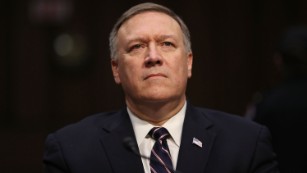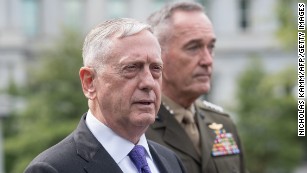Prima di leggere questo servizio della CNN sarà opportuno ricordare che il 3 agosto il presidente Donald Trump ha firmato controvoglia una legge approvata a stragrande maggioranza del congresso (517 contro cinque voti) che stabiliva l'inasprimento delle sanzioni alla Russia dato che era ormai chiaramente dimostrata l'ingerenza di questo paese nelle elezioni presidenziali americane del 2016, che avevano favorito il candidato Donald Trump.
Bisogna ricordare anche la espulsione di gran parte della delegazione russa a Washington fatta da Obama prima di lasciare la Casa Bianca, per manifesta attività spionistica .
A questo punto uno si chiede per quale ragione l'attuale amministrazione abbia consentito alla C.I.A. al massimo livello di avere rinnovati incontri con l'intelligence russa.
Stando a quello che risulta non si trattava certo di meeting routinari sul terrorismo, quanto piuttosto della possibilità di alleggerire il carico di sanzioni contro la Russia.
Le fibrillazioni di questi giorni a Washington stanno ad indicare che l'attuale presidente degli Stati Uniti è pesantemente compromesso con l'amministrazione Putin che lo starebbe ricattando per promesse fatte e non mantenute.
Ed è questo il terreno sul quale da mesi sta muovendo l'indagine del consigliere speciale Robert Mueller contro il quale si vanno accanendo lo stesso Donald Trump e i suoi fedeli al Congresso.
Oscar
_______________________________________________
CIA Director Mike Pompeo did meet with the head of Russia's foreign intelligence agency, an official barred from entering the US under 2014 sanctions, as well as the head of Russia's internal security agency, according to a US official with direct knowledge of the meetings.
The official said Pompeo did not meet with the head of the GRU, the Russian military intelligence agency behind efforts to meddle in the 2016 US election. The CIA followed a multi-agency legal process to give access to Russian officials under sanctions, the official said.
CIA Director Mike Pompeo defended the meeting in a Thursday letter to Senate Minority Leader Chuck Schumer, declaring that he and other officials met with Russians for the same reason their predecessors did -- "to keep Americans safe."
Schumer, whose staff was briefed on the meetings and the legal process involved before giving a Tuesday news conference, said the meeting represented "a serious national security issue." And he continued to blast Pompeo on Thursday.
"If this administration is ignoring sanctions, that's very serious," the New York Democrat told CNN, noting that in the letter, Pompeo didn't directly acknowledge that he had met with his Russian counterparts. "Director Pompeo's refusal to answer that question is deeply troubling."
News of the meeting comes as Russia's interference in the 2016 election continues to cast a shadow over Washington. The administration and the FBI are at odds over the release of a congressional memo about surveillance related to possible links between the Trump campaign and Russia.
And lawmakers are blasting the Trump administration for failing to impose new Russia-related sanctions that some had expected this week.
The Russian Embassy in Washington announced the Pompeo meeting in a Jan. 30 tweet. "It is no accident the Russians announced this meeting," the US official said. "The target was sowing discord in US," said the official, who also noted all administrations have met with Russian intel officials for intel-sharing and outreach.
The head of Russia's foreign intelligence service, SVR, Sergey Naryshkin, has been barred from entering the US since 2014 sanctions for Russia's destabilizing activities in Ukraine were imposed. Alexander Bortnikov, the head of the FSB, the country's internal intelligence service, has been sanctioned by the European Union.
Indeed, there is a very long history of US attempts to cooperate with Russian intelligence services, said Andrew Weiss, a vice president of studies at the Carnegie Endowment who oversees research into Russia and Eurasia.
That said, Weiss adds that, "the Russian government clearly wants to portray the US as being open to conducting business as usual ... which is both cheeky and presumptuous given how badly damaged the relationship is today."
The high point of US-Russian intel cooperation came after the terrorist attacks of Sept. 11, 2001. "But even then, there was always a huge amount of mistrust" and differing views on terrorism "that got in the way of cooperation," Weiss said.
"There's just a fundamental difference piled on top of the fact that the two countries' intelligence agencies are basically at war," Weiss said. Add to that the charged political environment in Washington surrounding Russia.
"Anybody sitting inside US government today not only has to make decisions about the practical aspects of dealing with Russian counterparts, but also the political fallout," Weiss said.
And if intelligence officials do see a benefit in conferring with Russians, "it's really hard for people outside the intelligence community to know what stands behind those kind of decisions."
In his letter to Schumer, Pompeo said that, "while Russia remains an adversary, we would put American lives at greater risk if we ignored opportunities to work with the Russian services in the fight against terrorism."
Pompeo also stressed that when these meetings do take place, "we cover very difficult subjects in which American and Russian interests do not align."
"We vigorously defend America in these encounters and pull no punches -- we never will," he wrote.
Asked about allowing Naryshkin entry to the US, State Department spokeswoman Heather Nauert said, "I can tell you in a general matter if something is considered to be in the national security interest of the United States, just like other countries, we have the ability to waive that so that people can come into the United States."
Nauert added that, "it is no secret that despite our many, many differences -- and we just talked about them -- with the Russian government, we also have areas where we have to work together, and one of those is combating terrorism and ISIS, and so I will leave it at that."

